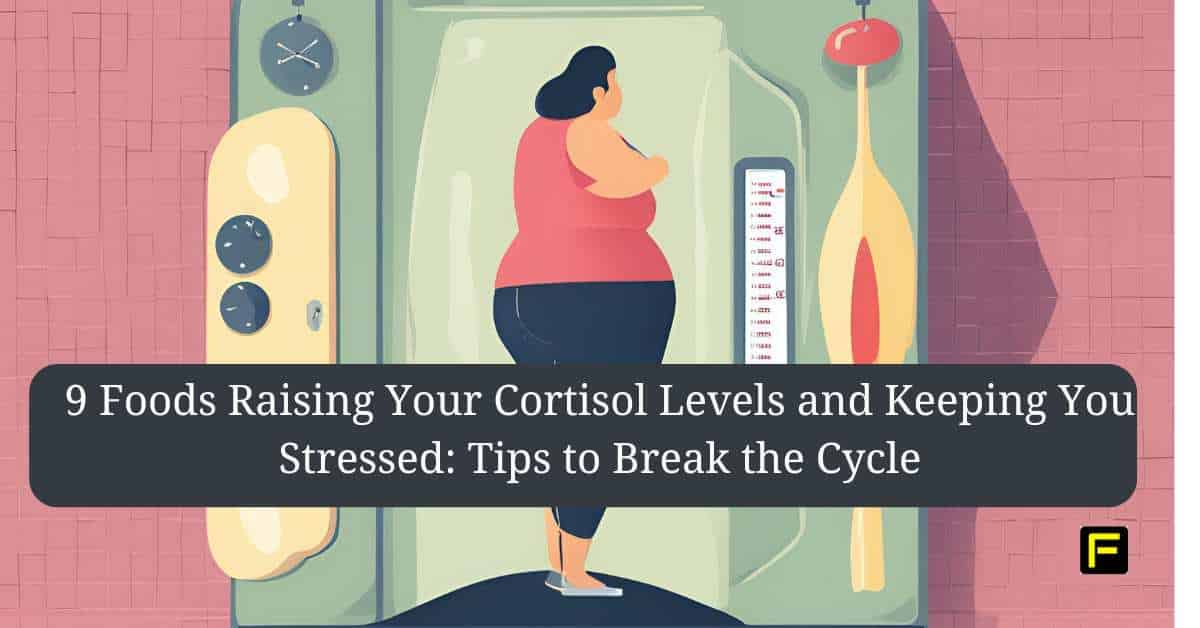Feeling stressed? Did you know your daily snacks could be spiking your stress hormones? While cortisol, the body’s primary stress hormone, is crucial for handling stressful situations, chronically high levels can take a toll on your health. Elevated cortisol is linked to weight gain, fatigue, poor sleep, and even a weakened immune system. But did you know that certain foods can raise cortisol levels, keeping your body stuck in a stress cycle? This article dives into the surprising foods that elevate cortisol and offers practical tips to help you reduce stress through better dietary choices.
What Is Cortisol and Why Does It Matter?
Cortisol is produced by the adrenal glands and plays a critical role in several bodily functions, including regulating metabolism, controlling blood sugar, and managing inflammation. It’s often called the “stress hormone” because it’s released in response to stress.
Under normal circumstances, cortisol follows a daily rhythm: it peaks in the morning to help you wake up and gradually decreases throughout the day. However, when your body is under constant stress—whether due to lifestyle, sleep deprivation, or diet—cortisol levels can remain elevated. Prolonged high cortisol levels can lead to issues like:
- Increased abdominal fat storage.
- Insulin resistance.
- Anxiety and depression.
- Difficulty sleeping.
Did You Know? Chronic stress and elevated cortisol levels have been associated with a 47% increased risk of heart disease, according to research published in The Lancet.

Top Foods That Elevate Cortisol Levels
Certain foods naturally trigger a cortisol response due to their effects on blood sugar, inflammation, or stress pathways. Here are nine surprising culprits:
1. Sugary Foods and Drinks
Sugary snacks, desserts, and sodas might give you a quick energy boost, but they can wreak havoc on your cortisol levels. High sugar intake causes blood sugar spikes, prompting your body to release cortisol to regulate the crash that follows.
- Examples: Candy, pastries, energy drinks, and sweetened beverages.
- Why It Matters: A study published in Nutritional Neuroscience found that diets high in sugar are linked to increased cortisol secretion and heightened stress responses.
What You Can Do: Replace sugary snacks with whole fruits or nuts to keep blood sugar stable and reduce stress on your body.
2. Processed and Packaged Foods
Convenience foods like chips, instant noodles, and frozen meals are often packed with unhealthy fats, refined carbohydrates, and sodium—all of which can contribute to cortisol elevation. These foods are also low in nutrients, making them poor choices for stress management.
- Examples: Potato chips, frozen pizzas, and prepackaged snacks.
- Why It Matters: High-sodium diets can increase blood pressure, which is closely tied to cortisol levels.
Did You Know? According to the CDC, the average American consumes 3,400 mg of sodium daily—far above the recommended 2,300 mg.
3. Caffeinated Beverages
While coffee, tea, and energy drinks can provide a temporary energy boost, overconsumption can overstimulate your adrenal glands and lead to higher cortisol levels.
- Examples: Coffee, black tea, green tea, and energy drinks.
- Why It Matters: A study in the Journal of Endocrinological Investigation found that caffeine can increase cortisol levels for up to three hours after consumption, especially when consumed on an empty stomach.
What You Can Do: Limit caffeine intake to 1-2 cups per day and avoid drinking it on an empty stomach.
4. Alcohol
Alcohol may feel like a stress reliever, but it can disrupt your body’s natural cortisol regulation over time. While moderate drinking may not have a significant impact, excessive alcohol consumption has been linked to increased cortisol production.
- Why It Matters: A study in Alcohol Research found that alcohol consumption raises cortisol levels, particularly in heavy drinkers.
Did You Know? Chronic alcohol consumption is associated with poor sleep quality, which further exacerbates stress and cortisol levels.
5. High-Sodium Foods
Salty foods can raise blood pressure, prompting your body to release more cortisol to counteract the stress on your cardiovascular system.
- Examples: Processed meats, canned soups, and salted snacks.
- What You Can Do: Opt for low-sodium versions of your favorite foods or season your meals with herbs and spices instead of salt.
6. Refined Carbohydrates
Refined carbs, such as white bread and pasta, are quickly broken down into sugar, causing rapid blood sugar spikes and crashes. This triggers cortisol production as your body works to stabilize blood sugar levels.
- Examples: White bread, white rice, pastries, and crackers.
- What You Can Do: Choose whole-grain options to provide sustained energy and reduce cortisol spikes.
7. Artificial Sweeteners
Artificial sweeteners like aspartame and sucralose may contribute to stress responses in some individuals. While they’re calorie-free, studies suggest they might affect the brain’s stress regulation pathways.
- Examples: Diet sodas, sugar-free gum, and low-calorie snacks.
- Why It Matters: Some research indicates that artificial sweeteners can lead to heightened cortisol responses in certain individuals, although more studies are needed.
8. High-Fat Dairy Products
Dairy products like whole milk, cheese, and cream can be inflammatory for some people, potentially leading to higher cortisol levels.
- Why It Matters: Inflammation is a known trigger for cortisol production.
What You Can Do: Opt for low-fat or plant-based dairy alternatives like almond or oat milk.
9. Fried Foods
Fried foods, such as fried chicken, french fries, and doughnuts, are often cooked in unhealthy oils and contain high levels of trans fats. These can increase inflammation in the body, which in turn raises cortisol levels.
- Examples: Fried chicken, french fries, onion rings, and doughnuts.
- Why It Matters: A study published in The American Journal of Clinical Nutrition found that trans fats can significantly contribute to inflammation, a key driver of cortisol production.
What You Can Do: Opt for baked or air-fried alternatives to enjoy the same flavors with less impact on your cortisol levels.

Why These Foods Matter for Stress Management
The foods you eat directly impact your body’s stress response. Chronic cortisol elevation can lead to:
- Weight Gain: Excess cortisol promotes fat storage, especially around the abdomen.
- Poor Sleep: Elevated cortisol disrupts sleep cycles, leading to insomnia.
- Mood Swings: High cortisol levels are linked to anxiety and irritability.
- Weakened Immunity: Chronic stress impairs your immune system, making you more susceptible to illnesses.
Interesting Stat: According to a survey by the American Psychological Association, 38% of adults reported that unhealthy eating habits contribute to their stress levels.
Quick Quiz: Is Your Diet Spiking Your Cortisol Levels?
Take this short quiz to assess if your eating habits might be contributing to elevated cortisol levels:
- Do you regularly consume sugary snacks, sodas, or desserts?
- (A) Yes, often
- (B) Occasionally
- (C) Rarely or never
- How often do you eat processed or packaged foods (e.g., chips, instant noodles)?
- (A) Daily
- (B) A few times a week
- (C) Rarely or never
- Do you rely on caffeine (coffee, tea, or energy drinks) to get through the day?
- (A) Yes, multiple times a day
- (B) Once a day
- (C) Rarely or never
- How much alcohol do you drink per week?
- (A) More than 7 drinks
- (B) 1-6 drinks
- (C) Rarely or never
- Do you often consume fried or fast foods?
- (A) Yes, multiple times a week
- (B) Occasionally
- (C) Rarely or never
Results:
- Mostly A’s: Your diet may be significantly contributing to high cortisol levels. Consider adopting healthier eating habits.
- Mostly B’s: Your diet is moderately balanced, but there’s room for improvement to reduce stress.
- Mostly C’s: You’re on the right track! Keep making mindful food choices to maintain lower cortisol levels.
Tips for Lowering Cortisol Through Diet
To keep cortisol levels in check, try these actionable tips:
- Eat Whole, Unprocessed Foods: Incorporate more fruits, vegetables, lean proteins, and whole grains into your diet.
- Balance Blood Sugar: Eat small, balanced meals throughout the day with a mix of protein, healthy fats, and complex carbs.
- Stay Hydrated: Replace sugary drinks with water, herbal teas, or coconut water.
- Limit Caffeine and Alcohol: Enjoy these beverages in moderation and avoid consuming them late in the day.
- Incorporate Stress-Reducing Foods: Include foods like salmon, avocados, and dark chocolate, which are rich in omega-3s and antioxidants that help manage cortisol levels.
Conclusion
Your diet plays a significant role in managing stress and cortisol levels. What changes can you make today to lower your cortisol levels? Foods high in sugar, salt, and unhealthy fats can elevate cortisol and keep you feeling stressed, while whole, nutrient-dense foods can help reduce its effects. By making mindful choices, you can support your body’s stress response and improve overall well-being.
Call to Action: What changes will you make to your diet today to lower cortisol levels? For more tips on stress management and nutrition, visit trusted health sources like Healthline or Mayo Clinic.

Claudia Faucher is a fitness and lifestyle blogger who shares practical tips for women over 50 on staying active, stylish, and confident. As the creator of FitFab50.com and Beyond59.com, she covers topics like workout gear, beauty trends, and wellness routines. Claudia is passionate about helping others live their best life at any age.
Last update on 2026-03-02 / Affiliate links / Images from Amazon Product Advertising API



